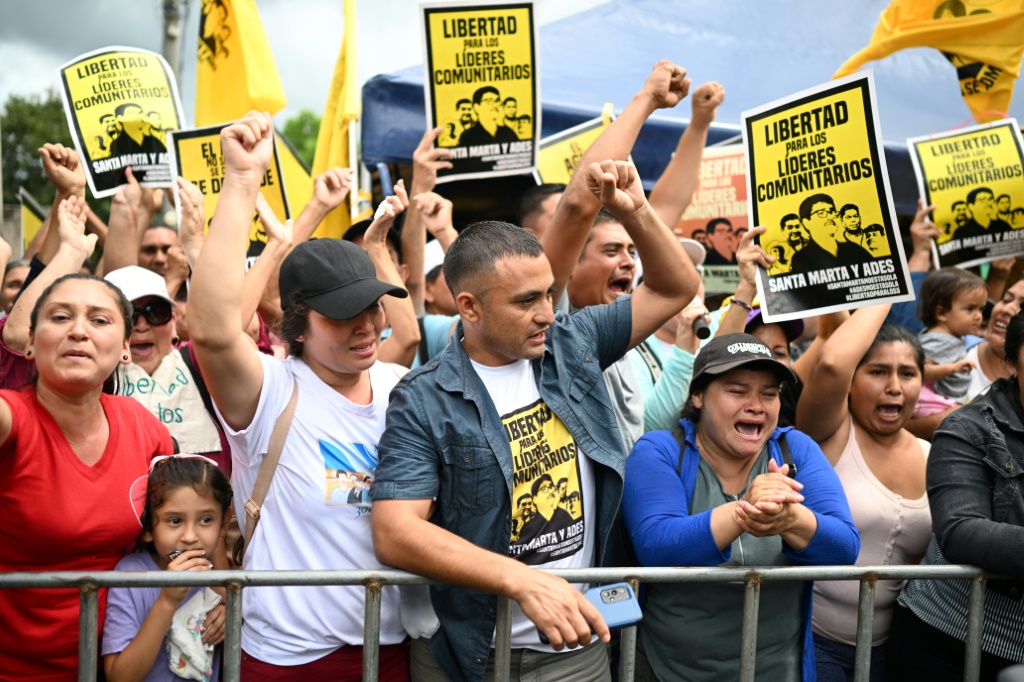The defendants—guerrilla fighters at the time of the killing—were acquitted on October 18 along with three other former rebels, but an appellate court overturned the verdict and ordered a retrial.
Prosecutors contend that the eight men killed María Inés Alvarenga in August 1989 in the community of Santa Marta because they believed she was an “army informant.”
“This case is nothing but the criminalisation and persecution of environmental activism. They are key figures in the community’s resistance to metallic mining,” said Alfredo Leiva, a board member of the Asociación de Desarrollo Económico y Social Santa Marta (Santa Marta Association for Economic and Social Development, ADES).
The five activists spearheaded El Salvador’s 2017 ban on metal mining, a prohibition the pro-government Legislative Assembly repealed in December at the request of President Nayib Bukele, who is pushing to revive gold extraction.
The three-day hearings will be held at San Salvador’s Judicial Center and will proceed in absentia; the whereabouts of the eight former guerrillas are unknown.
The environmentalist defendants—Teodoro Pacheco, Saúl Rivas, Alejandro Laínez, Miguel Gámez and Pedro Rivas—turned to activism after the 1980-1992 civil war.
“The only ‘crime’ these environmentalists have committed is defending water, the environment, health and the lives of present and future generations, now gravely threatened by the return of metal mining,” Leiva added.
The other defendants are former commander Fidel Recinos and fellow veterans José Sancho and Arturo Serrano, all members of the left-wing Frente Farabundo Martí para la Liberación Nacional (FMLN).
Leiva argued that “there is no evidence” against the environmental leaders and that the prosecution rests on the “contradictory account” of a suspect granted protected-witness status.
El Salvador’s civil war ended with the 1992 peace accords after claiming 75,000 lives and leaving more than 7,000 people missing.
In 1993, the Legislative Assembly passed an amnesty shielding wartime crimes from prosecution, but in 2016 the Supreme Court of Justice declared it unconstitutional.
Ambientalistas enfrentan nuevo juicio por asesinato en 1989 en El Salvador
Los ambientalistas, que en la época del crimen eran guerrilleros, fueron absueltos el 18 de octubre, junto a otros tres exrebeldes también acusados del asesinato, pero un tribunal superior anuló el fallo y ordenó repetir el juicio.
La fiscalía acusa a los ocho de haber matado en agosto de 1989 a María Inés Alvarenga en la localidad de Santa Marta porque la consideraban “informante del ejército”.
El caso “es una criminalización y persecución del activismo ambiental (…) son actores claves en la resistencia comunitaria contra la minería metálica”, declaró en rueda de prensa Alfredo Leiva, del directorio de la Asociación de Desarrollo Económico y Social Santa Marta (ADES).
Los cinco ambientalistas alentaron la prohibición de la minería en 2017, pero esta fue revocada en diciembre pasado por el Congreso oficialista a pedido del presidente de El Salvador, Nayib Bukele, que promueve la explotación de oro.
En las audiencias, previstas durante tres días en el Centro Judicial de la capital San Salvador, serán juzgados en ausencia pues se desconoce el paradero de los ocho exguerrilleros.
Los acusados que se convirtieron en ambientalistas después de la guerra civil (1980-1992) son Teodoro Pacheco, Saúl Rivas, Alejandro Laínez, Miguel Gámez y Pedro Rivas.
“El único delito de los ambientalistas es defender el agua, el medio ambiente, la salud y la vida de las generaciones presentes y venideras gravemente amenazadas por la reactivación de la minería metálica”, afirmó Leiva.
Los otros tres acusados son el excomandante Fidel Recinos, y los también exguerrilleros José Sancho y Arturo Serrano, pertenecientes al izquierdista Frente Farabundo Martí para la Liberación Nacional (FMLN).
Leiva sostuvo que “no hay elementos de prueba” contra los líderes ambientalistas y que la acusación de la Fiscalía se basa en el “relato contradictorio” de un sospechoso “testigo protegido”.
La guerra civil salvadoreña finalizó en 1992 mediante la firma de acuerdos de paz. Tuvo un saldo de 75.000 muertos y más de 7.000 desaparecidos.
En 1993, el Congreso aprobó una amnistía que perdonó los crímenes del conflicto, pero en 2016 la Corte de Justicia la declaró inconstitucional.

